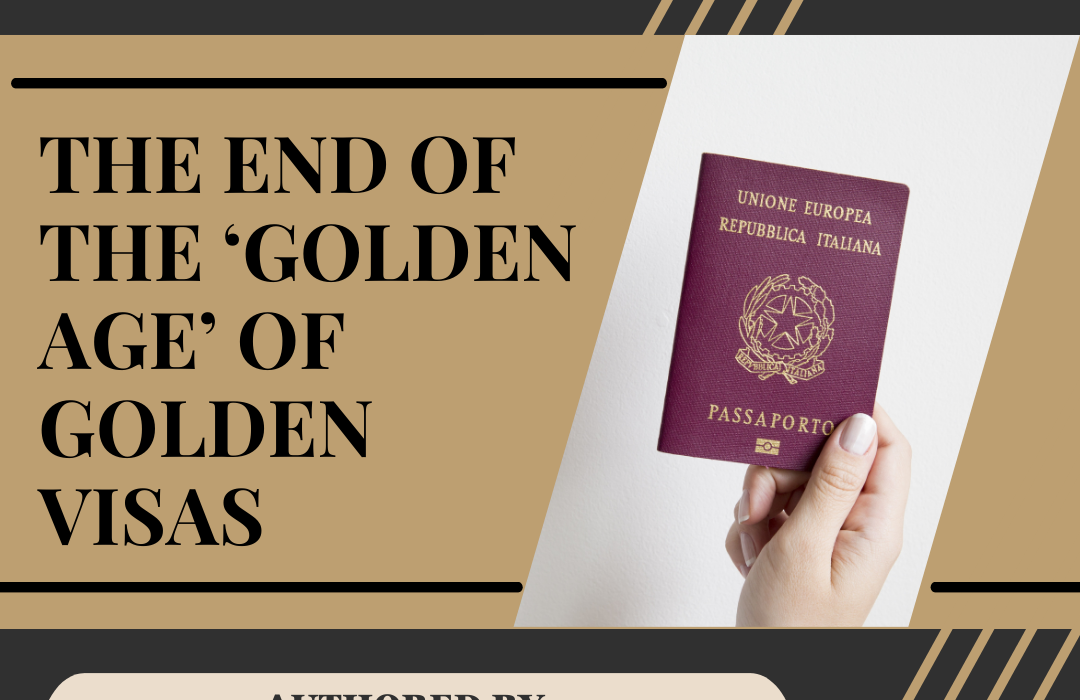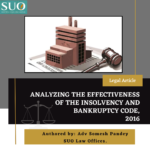THE END OF THE ‘GOLDEN AGE’ OF GOLDEN VISAS
Introduction
By offering residence or potential citizenship in exchange for the investment of a hefty sum, many countries across the globe view golden visas as a tool to attract high-net-worth individuals. However, the famous golden visa has been the subject matter of great controversy lately. While some argue that it is a great way to attract capital and skilled human resource, one simply cannot ignore the multitude of drawbacks surrounding the same, such as the risk of money laundering, exploitation by criminals, widening of wealth gap, increased corruption, to name a few. The author, by way of this article, attempts to examine the history, exploitation, and subsequent implications of golden visas.
The History of Golden Visas
Golden visas are best known as a fast-track route to residence, and even citizenship in some cases. They grant an individual the ability to live and work in the country of choice, along with multiple other perks such as access to its healthcare and educational systems, and visa-free travel to various countries. To qualify, you must satisfy the minimum investment threshold (varying from country to country) by way of investment into real estate, government bonds, incorporation of a new company resulting in the creation of a certain number of permanent jobs, or any other qualifying criteria based on the country of choice.
Located in the Carribean, St. Kitts and Nevis was the first country to open its doors to immigrant investors by way of launching its golden visa back in 1984. Multiple countries across the world would follow suit in the years to come, especially in light of the 2008 recession. The golden visa is now offered by over a dozen countries across Asia, Europe, and the Americas. Some of the more popular options today include Greece, Cyprus, Thailand, and the UAE, among others. On the other hand, there also exist some countries which offer citizenship by investment programs and are popularly known as golden passports. Some of them include Austria, Türkiye, and St. Lucia.
Implications of the Golden Visa
As discussed earlier, the golden visa offers benefits to the host countries, such as promotion of their economy and creation of new jobs, while also acting as a significant source of foreign direct investment (FDI). However, it would be grossly ignorant to turn a blind eye towards the negative aspects. To begin with, among the first and most valid criticisms is the perpetuation of inequality and the exacerbation of the already existing, and rather wide wealth gap. It would not be an exaggeration in the slightest to imply that golden visas give preferential treatment to wealthier investors over other immigrants. Another area of controversy surrounding golden visas is their exploitation at the hands of organized crime syndicates and corrupt government officials. Many countries go as far as having no minimum stay requirement which must be fulfilled to maintain the residency, which in turn leads to another problem: lack of integration and no sense of belongingness in the society of the host country.
Additionally, there have been multiple instances of infamous criminals exploiting golden visa schemes to evade criminal proceedings in their home countries. Some of the most widely covered instances would be India’s Mehul Choksi, and Malaysia’s Low Taek Jho. While diamond trader Choksi procured the citizenship of Antigua & Barbuda to evade bank fraud charges, businessman Jho bought a Cypriot citizenship to escape proceedings related to his involvement in Malaysia’s infamous 1MDB scandal. While these incidents receive widespread media attention, they are often wrongly compared to regular immigrants, who spend their hard-earned money and multiple years waiting for a final decision on their visa applications.
Another pressing concern that cannot be sidelined is the unprecedented hike in property prices. There are multiple developers who are engaged in developing properties solely for golden visa investors, and thus hike the prices artificially. A study conducted in Portugal demonstrated that the golden visa scheme has resulted in a series of consequences being borne by the real estate market and locals, including price distortions and displacement of financially weaker residents, particularly in urban areas like Lisbon. Owing to the €500,000 threshold, the western European country has witnessed a drastic increase of over 60% in housing prices since the launch of the Portuguese golden visa programme back in 2012.
Owing to the aforementioned factors and great dissatisfaction among locals, particularly towards the housing crisis, golden visas have come under great scrutiny.
Golden Visas: The Beginning of the End?
The implications of golden visas have not gone unnoticed, with governmental and regulatory authorities strongly clamping down on these programs across the globe. The biggest and perhaps most widely covered example of the same would be the European Commission (hereinafter referred to as “The EC”), with the authority clearly stating “Visa-free access to the EU should not be used as a commercial commodity to be sold and bought.” After it was revealed that Caribbean nations sold over 88,000 golden passports (with the starting price being around $100,000 per head) to citizens of countries such as China, Russia, and Iran, the EU has vowed to tighten visa controls. The EC, in a proposal to the European Parliament for the enactment of new laws, stated that the EU should have the possible option to “suspend visa exemptions for third countries that choose to operate on an investor citizenship scheme whereby citizenship is granted without any genuine link to the third country concerned.” The commission’s primary concern, a rather justified one is that individuals acquiring additional citizenships could impede border control practices due to the liberty to change their names and identities.
Additionally, the EC has also urged EU member states to repeal any existing schemes offering citizenship by investment in order to ensure the efficiency of border checks, along with the minimization of risks posed by such schemes. Though multiple EU nations offered golden visas at the peak of EU’s debt crisis in the early 2010s, most of them have repealed, or are in the midst of repealing these schemes as a result of housing concerns, corruption, security reasons, etc. While Spain is the latest country to scrap its golden visa program (April 2024), other significant golden visa repeals/ revamps include Portugal, Ireland, and Malta. This series of events was also a result of the Russia-Ukraine conflict, which once again raised concerns pertaining to the aspects of money laundering and tax evasion.
However, EU nations are not the only ones scrapping or revamping their golden visa programs. The sentiment towards golden visas was echoed by multiple countries across the globe. Recently, Australia also pulled the plug on its so called ‘golden visa scheme’, which was originally designed to attract foreign investment, but instead delivered ‘poor economic outcomes.’ The Australian government is now focusing on providing more visas for skilled migrants. Another nation that followed suit was the United Kingdom, which scrapped its scheme offering fast-track residency, owing to concerns surrounding money-laundering upon the onset of Russia-Ukraine conflict.
Conclusion
With the cons seemingly having outweighed the pros, along with the massive shift in immigration policies, there now exists a massive question mark on the relevance of these so-called golden visa programs. In conclusion, it would not be wrong to say that though they come with their fair share of advantages to the host countries, golden visas have become a mere tool to translate private financial power into ‘rights’ under the garb of global citizenship. However, this does not pose a threat to your dreams of going global. Countries across the globe offer multiple feasible alternatives such as entrepreneurship visas, public-private partnerships, and startup visas. Though time-taking, they will result in the creation of a win-win situation for the host country and migrants, while also ensuring the latter’s smooth integration in the society and system.
Authored by: – Priyamvada Lonial, Advocate, SUO Law Offices



